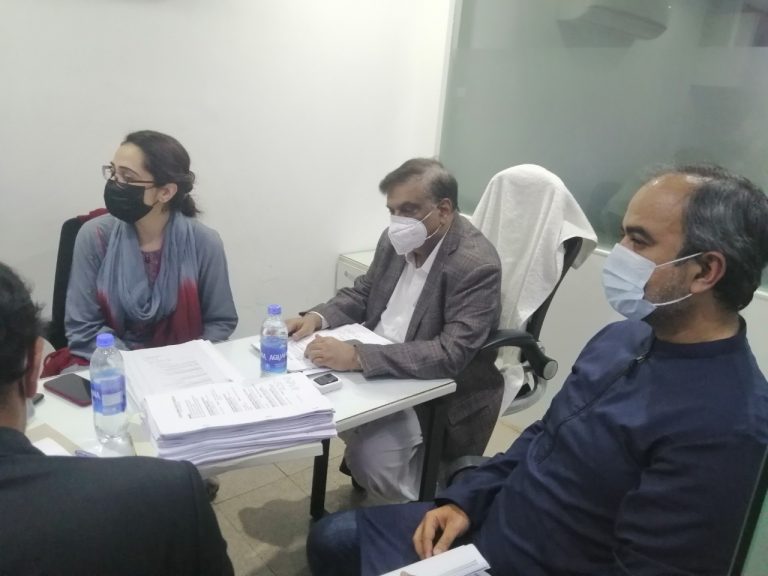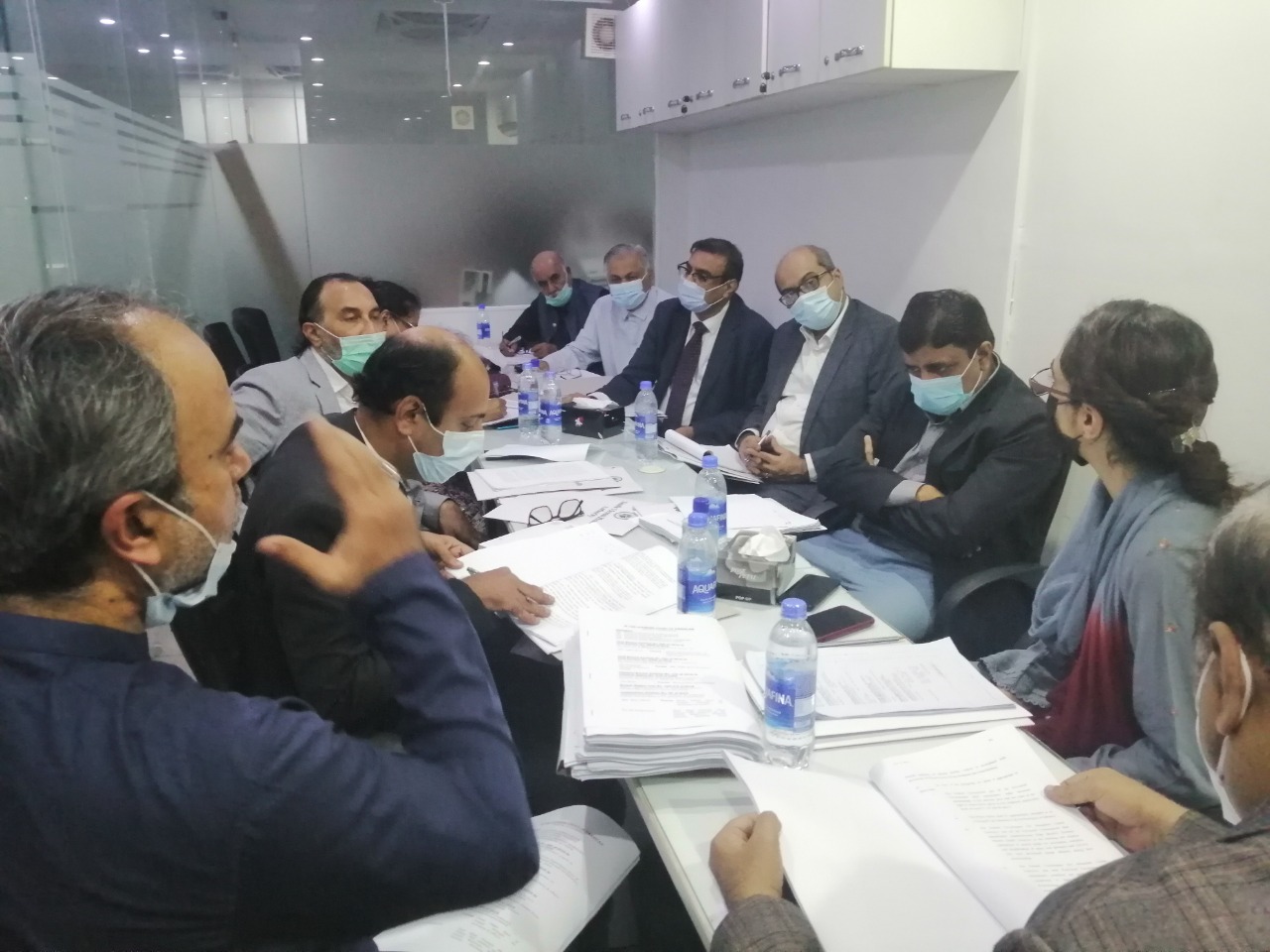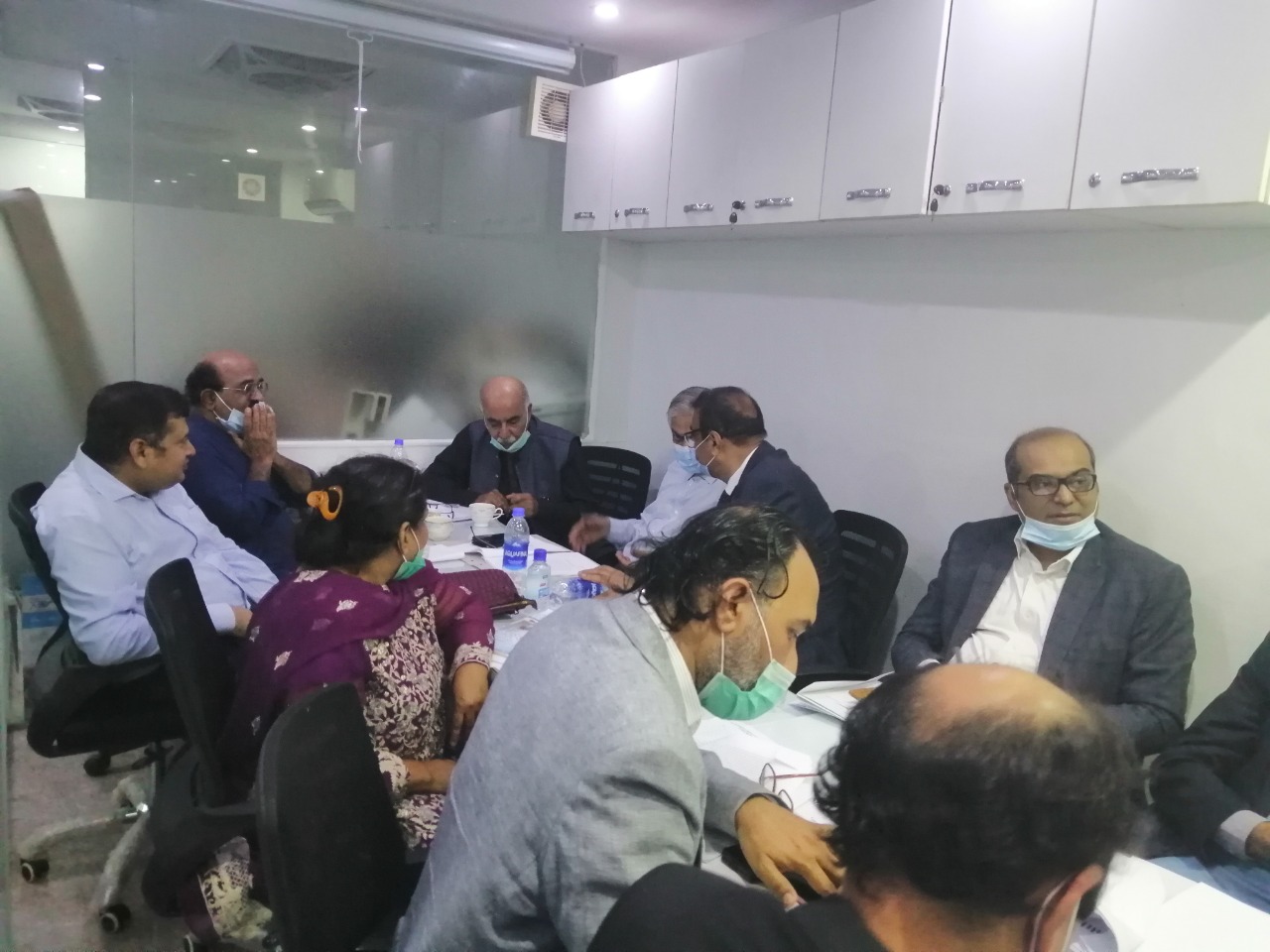
The decision is in line with Supreme Court verdict for imparting training to the judges, prosecutors, lawyers, court staff and jail personnel on mental illness including forensic mental health assessment.
Currently 222 mentally ill prisoners are lodged in 11 prisons of Sindh
Sindh Courier Report
Karachi
Sindh Mental Health Authority (SMHA), in its meeting on Wednesday with Justice Project Pakistan officials agreed to the need of imparting training to the judges of trial courts, prosecutors, lawyers, court staff, jail personnel and social workers on mental illness including forensic mental health assessment as suggested by the Supreme Court of Pakistan.
The meeting, convened to review the apex court’s verdict regarding Prison Rules related to the inmates suffering from mental illness, was chaired by Senator Dr. Karim Khawaja, Chairman SMHA. Sindh is the first among all the provinces to convene such meeting to discuss ways and means for taking practical steps in the light of apex court’s judgment in a constitutional petition.
The participants agreed to court recommendation of launching training programs and short certificate courses on forensic mental health assessment.
 Taking part in the discussion Prof. Haider Naqvi, Dr. Waseem Alvi, Dr. Chuni Lal, and Dr. Jamil Junejo suggested launching of training program under SMHA in collaboration with Sindh Judicial Academy. “All teaching institutes should be part of this initiative to contribute in teaching and training.”
Taking part in the discussion Prof. Haider Naqvi, Dr. Waseem Alvi, Dr. Chuni Lal, and Dr. Jamil Junejo suggested launching of training program under SMHA in collaboration with Sindh Judicial Academy. “All teaching institutes should be part of this initiative to contribute in teaching and training.”
“The Federal Judicial Academy, Islamabad and all the Provincial Judicial Academies should also arrange courses for trial court judges, prosecutors, lawyers and court staff on mental illness including forensic mental health assessment. SMHA in collaboration with judicial academy Sindh should design a course and Justice Project Pakistan can facilitate this project at various levels,” they said.
Dr. Karim Khawaja informed the meeting that SMHA had already approached the Judicial Academy and other concerned authorities for initiating the process however no headway could be made during last two years due to Covid-19 outbreak. “Imparting training to such a large number of personnel is an uphill task and will take at least two years to achieve some progress in view of limited resources and short number of experts,” he remarked.
According to SMHA Chairman, the number of judges alone, from lower courts to high court, is more than 1300 while the number of Psychiatrists available in Sindh is hardly 105. “In such a situation, collective efforts by different concerned departments and organizations are direly needed,” he asserted.
It was finally decided, as suggested by the participants, to initiate a process for signing Memorandum of Understanding among SMHA, Sindh Health Department, Provincial Home Department, Prison Department and the Justice Project Pakistan to take concrete steps for launching training programs.
At the outset, Ms. Zainab Mehboob of Pakistan justice project elaborated the salient features of judgement and explained the one by one directions of apex court regarding making necessary amendments in the relevant laws and the rules.
 Discussing the judgment para-wise, the participants reviewed the existing laws and rules and the facilities available in all the prisons of Sindh province for the assessment of inmates’ state of mental health of inmates and their treatment.
Discussing the judgment para-wise, the participants reviewed the existing laws and rules and the facilities available in all the prisons of Sindh province for the assessment of inmates’ state of mental health of inmates and their treatment.
The meeting discussed apex court’s suggestion of formation of Medical Board consisting of two qualified and experienced Psychiatrists and a Psychologist from public sector hospitals at each divisional headquarter of province for examination, assessment and rehabilitation of the under-trial and convicted prisoners, if referred by the jail authorities. The court recommendation also envisages authorizing the Medical Board to examine those accused persons who are referred by the Trial Courts for examination under the provisions of Sections 464 and 465 Cr. P. C.
Dr. Karim Khawaja and other experts, finding certain ambiguity in this recommendation, viewed that the provincial law department should be approached for clarification as such kind of Medical Board already exists at SMHA. “The inmates suffering from mental illness are already referred to this Medical Board, whenever needed, by the concerned authorities,” SMHA Chairman told.
Senator Dr. Karim Ahmed Khawaja informed the participants that SMHA will write a letter to Sindh Law Department for clarification regarding present laws and amendments directed by apex court.
The apex court recommendations also envisaged formation of Medical Board comprising of three qualified and experienced Psychiatrists and two Psychologists from public sector hospitals for examination and evaluation of the condemned prisoners who are on death row and are suffering from mental illness to ensure that such mentally ill condemned prisoners who no longer have the higher mental functions to appreciate the rationale and reasons behind the sentence of death awarded to them are not executed. In relation to this point, Senator Dr. Karim Ahmed Khawaja again informed the participants that a Board is already constituted under SMHA Act 2013. However, Sindh mental health authority will seek legal opinion regarding this point. Ms. Zainab clarified that this judgement directed the board for all those prisoners who are in death row and suffering from severe mental illness, can be examined and evaluated from these boards and sentence of death awarded to them are not executed.
Prof Haider Naqvi told that there is already well established system working in all provinces. Special Medical Board is functional in all teaching institutes of province. The referral of mentally ill patients/prisoners is already being addressed through courts and director general health services Sindh office and through various prisons of Sindh. However, it was decided that SMHA will seek legal opinion from Law Department of Sindh.
As regards court instruction that the Prison Rules shall be appropriately amended so as to bring the jail manuals of all the provinces in harmony, IG Prisons Sindh Kazi Nazir Ahmed assured that he will take initiative and write a recommendation to Home Department and Law Departments as per guideline provided by SMHA.
IG Prisons informed that the number of inmates in all the 27 prisons of Sindh is around 20000 however the number of mentally ill prisoners is just 222. Giving breakup of the such prisoners he said 108 mentally ill prisoners are lodged at Central Prison Karachi, 38 at Central Prision Larkana, 29 at District Prison Malir Karachi, 28 at Central Prison Hyderabad, 6 at Central Prison Mirpur Khas, 5 at Central Prison Sukkur, 4 at District Prison Badin and one each at Central Prison Khairpur, Special Prison Nara Hyderabad, Special Prison for Women Hyderabad and District Prison Shikarpur.
On establishing High Security Forensic Mental Health Facilities in the teaching and training institutions of mental health for assessment, treatment and rehabilitation of under trial prisoners and convicts who have developed mental ailments during their incarceration, it was informed that forensic psychiatric services are already being provided to all mentally ill prisoners all over province. Special psychiatric services are available in Central Prisons of Karachi and Hyderabad, and psychiatric services are also being provided at Sukkur, Larkana, Khairpur and Nawabshah prisons however it was suggested that more is required to strengthen these services.
The participants, underlining the need of extension of Forensic Psychiatric Ward, proposed addition of female and juvenile forensic psychiatric ward at Sir Cowasjee Jahangir Institute of Psychiatry and Behavioral Sciences Hyderabad. Dr. Amir Dabir, Medical Superintendent, SCJIP&BS Hyderabad assured the participants that Sir Cowasjee Jahangir Institute will provide forensic Psychiatric Services to the female prisoners of Hyderabad.
Kazi Mubashir Aijaz from Justice Project Pakistan suggested that essential amendments are desperately needed in Sindh Mental Health Act 2013, for betterment of Forensic Psychiatric Services in Sindh. “Notification of Medical Board and periodic visit of Psychiatrist and Psychologist is mandatory to all prison of Sindh Province.” All the participants endorsed suggestion of Home Department, Government of Sindh for hiring of special cadre Doctors and Psychiatrist in all Prisons of Sindh.
The meeting was attended by Mr. Kazi Nazir Ahmed, Inspector General (Prisons) Sindh, Mr. Tariq Ahmed Qureshi, Additional Secretary (Prisons), Home Department, Government of Sindh, Mr. Irshad Khokhar, Secretary SMHA, Ms. Zainab Mahboob, Legal Head, Justice Project Pakistan, Mr. Mubashir Aijaz, Adv. of High Court and Consultant Justice Project Pakistan, Prof. Dr. Haider Naqvi, Head of Psychiatry Dept. Dow University, Dr. Chuni Lal, Associate Professor and In-charge Psychiatry Dept. JPMC, Dr. Syed Amir Dabir, Medical Superintendent, Sir Cowasjee Jahangir Institute of Psychiatry and Behavioral Sciences, Hyderabad, Dr. Zakia Khurshid, Additional Police Surgeon, Health Dept. Dr. Jameel Junejo, Associate Professor LUMHS, Mr. Riaz Hussain Baloch, Principal, Shaheed Zulfiqar Ali Bhutto Law College Malir, Dr. Waseem Alvi, CMO/Consultant Psychiatrist, Dept. of Psychiatry, Central Prison Karachi, Dr. Ali Gul Metlo, U.K (London), and Dr. Abdul Razzak Shaikh.
___________________